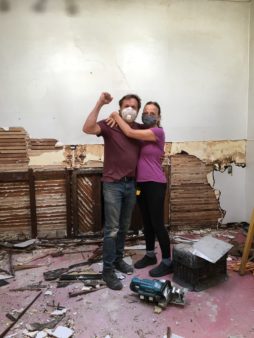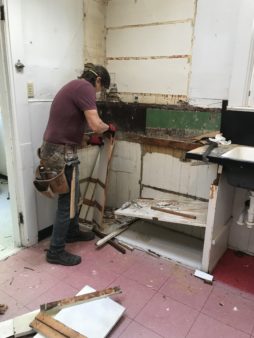Category: NYF News
Purposeful Living & Olga Murray: A Celebration and an Invitation
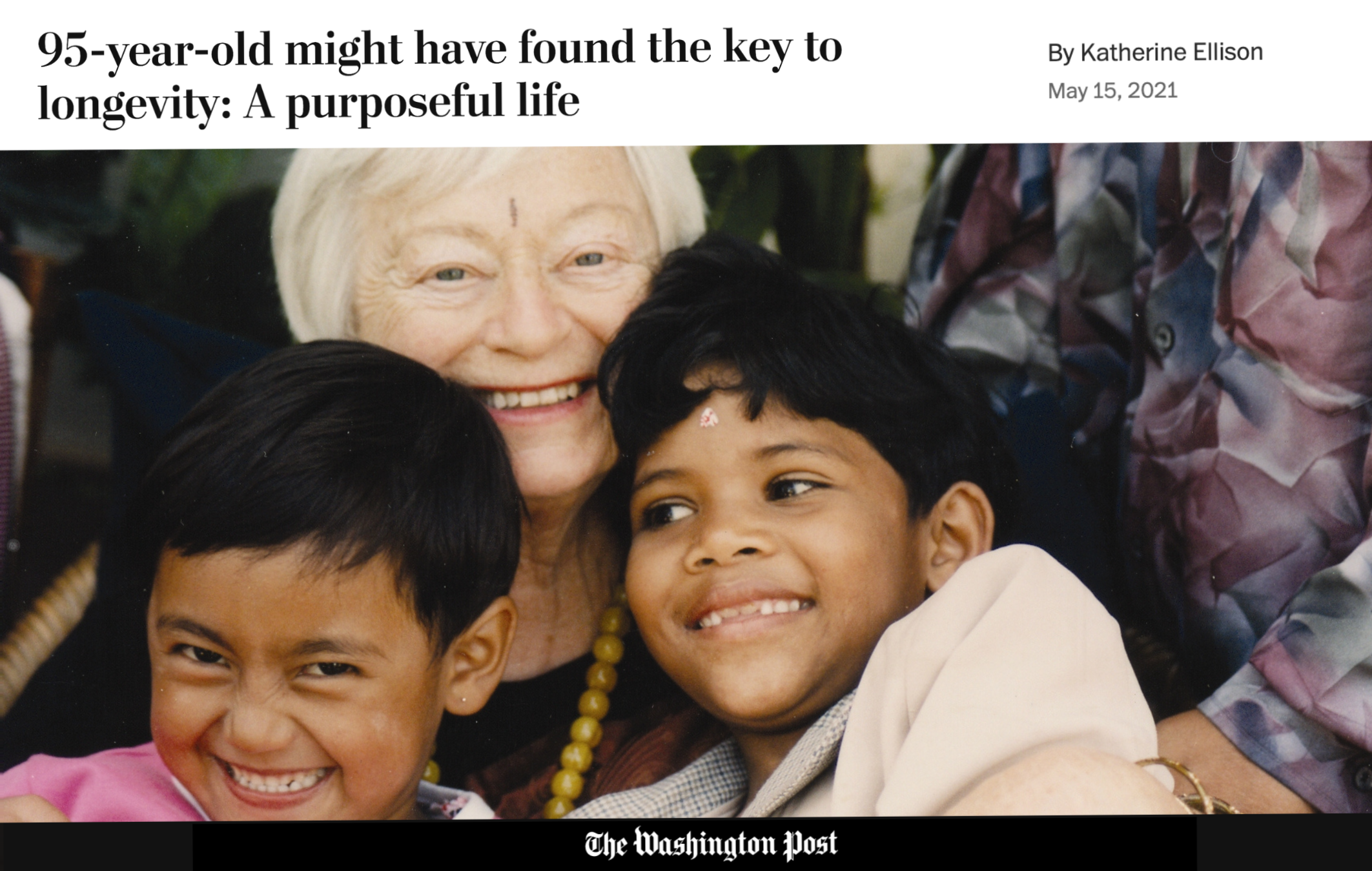
Purposeful living is the focus of a new Washington Post article about our very own founder, Olga Murray (click the link to open the article in a new tab – it is a beautiful tribute by Pulitzer-Prize winner Katherine Ellison!). Our beloved Olga, on the cusp of her 96th birthday, has been an inspiration during the past year of lockdowns and uncertainty.
‘ “I’m not a doctor,” ‘ the article quotes Olga during a recent interview, ‘ “but I do know that when I get out of bed every morning and think that I might help a little kid in Nepal, I’m not focused on my body… My main focus is on the kids.”
In her interview, Olga is characteristically modest. So much of Olga’s work is driven by her belief in others. She believes in those she partners with at NYF, like President Som Paneru. She believes in her friends, her connections – all those generous donors who make her work possible. Most of all, she believes in the children of Nepal, and in the incredible things they can accomplish if given the proper opportunities. (Bishnu Chaudhary, the young woman freed from domestic slavery who recently passed the Nepalese bar exam, is just one example!)
Even with purposeful living fueling her longevity, “I’m not going to be around forever,” Olga says pragmatically. “And the thing I want most in the world is for this program to go on.”
The NYF community is determined to make that wish come true.
If you’d like to learn more (and to see Olga Murray live over Zoom!), click here to register for our upcoming virtual Founder’s Day celebration! Join NYF’s email list here.
To support NYF’s mission during this challenging time – bringing Education, Health, Shelter, and Freedom to Nepali children – please donate here. For more powerful impact, consider making yours a monthly donation!
COVID Isolation Centers Provide a Lifeline as Nepal Battles a Surge
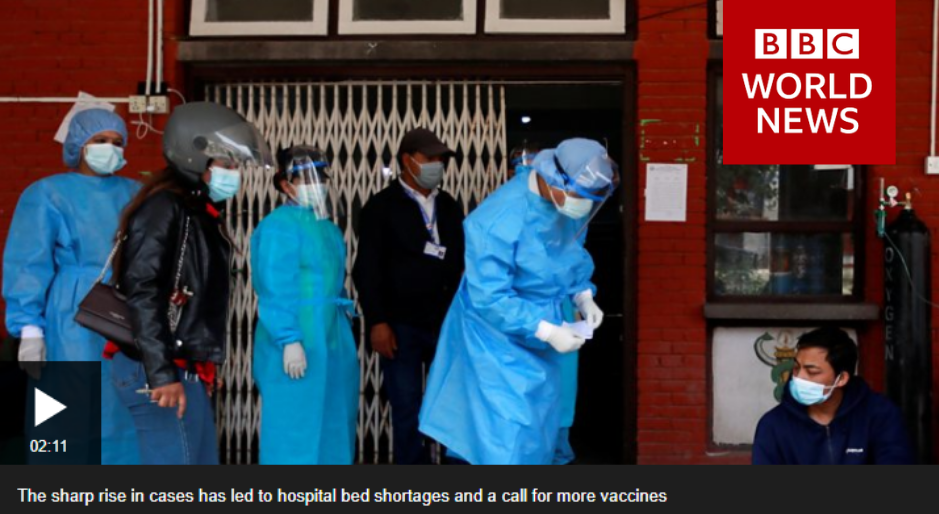
COVID isolation centers are becoming a life-saving necessity for families in Nepal as the pandemic surges through South Asia. Kathmandu is in lockdown once again, with schools closed and hospitals filled beyond capacity.
Nepal Youth Foundation opened our first COVID Isolation Center in our Kathmandu Nutritional Rehabilitation Home on Tuesday, May 4th, and it is already full, mostly with people under the age of 18. Isolation centers provide safe care for individuals who have been infected with COVID-19 and must be isolated from their families, but who are not sick enough to be hospitalized. Our vaccinated staff members are doing all they can to provide high-quality care to these children, working to ensure their safe recovery.
To help us respond to this growing crisis, please make a donation now.
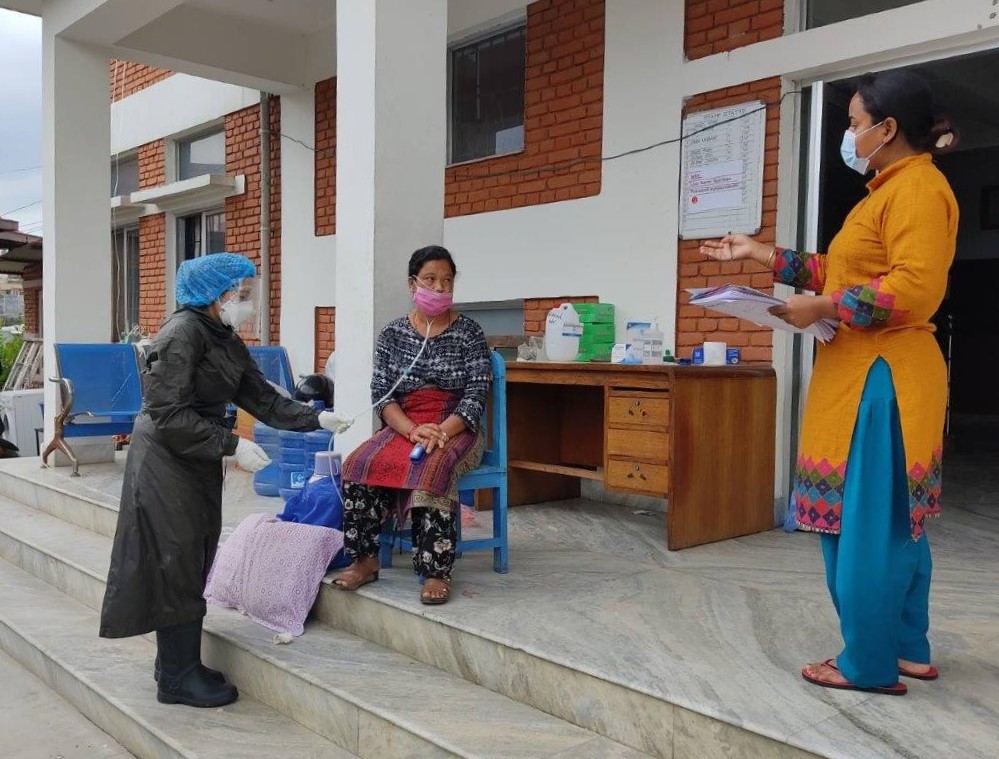
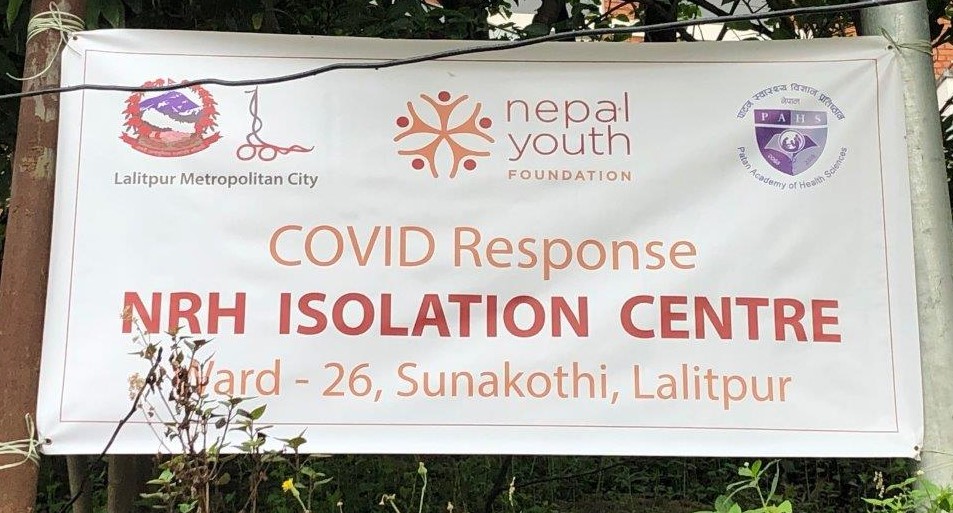


Som Speaks to BBC News

NYF President Som Paneru recently spoke with BBC News about the situation in Nepal. You may listen to the 2-minute interview here, or read the transcription below.
Som: The second wave is causing a great level of distress among the population here. The cases are rising at an alarming rate since the last couple of weeks. People are desperate to find life-saving services like oxygen, hospital beds, ICU, ventilators, etc. So a severe lack of safe isolation places is one of the root causes right now for spreading the virus. Families are living in very congested living conditions, and one family member gets infected and infects the rest. So that’s how it has reached every family and eventually the community. So the situation is very desperate, getting very desperate right now.
BBC News: And what are the hospitals saying in terms of, as you say, the beds. How have they been? Because we’ve been hearing what’s happening in neighboring India. How have people been managing if they haven’t had the oxygen supplies? Has it been the same where they’ve been buying their own cylinders, looking for them to be filled, or has it not yet got to that stage?
Som: We are pretty much going towards the same trail like in India. The families are desperate to secure a cylinder to keep at home. Because there are no places to go in hospitals. Hospitals are turning down new admissions in most of the places. Unless it is a really critical situation. So people are losing lives in the ambulance, traveling from one hospital to another.
BBC News: Can you tell us, please, Som, what your organization has been doing to try and help? What have you been seeing?
Som: Nepal Youth Foundation has recently started an isolation center. A safe isolation place for those people who are infected but are not able to go to hospital, and they cannot stay in the family either. So the isolation center is the first step towards breaking this chain of spreading the virus. So we’ve started one center in Kathmandu, and now there’s a huge demand for opening more centers like this across the country.
Slowing the spread of this virus is critical, and safe isolation centers are an important part of this process in crowded cities like Kathmandu. To learn about NYF’s other COVID responses, please visit our timeline here. And if you are able to donate, please do so by clicking the button below.
You’re invited: Founder’s Day 2021
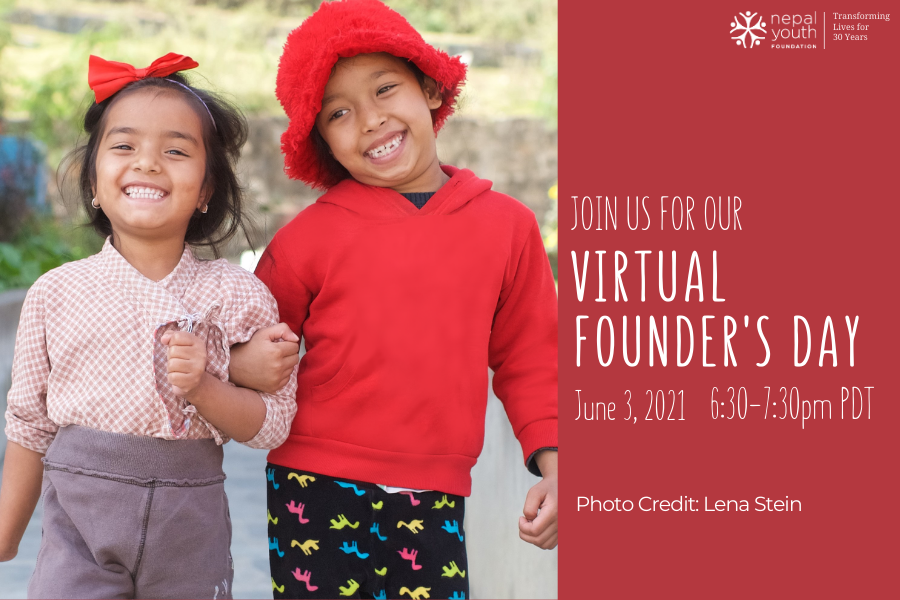
On June 3rd, Nepal Youth Foundation (NYF) will be hosting another “Virtual Founder’s Day” – a free event open to old and new friends alike.
Day: June 3, 2021
Time: 6:30-7:30 p.m. PDT
Location: Zoom!
At this event, we will be honoring Founder Olga Murray’s 96th birthday and President Som Paneru’s 25th year of service and leadership.
We’ll kick off the event by discussing recent COVID-19 developments in Nepal and talk about how NYF has responded to, and is continuing to respond to, the ongoing global pandemic. We’ll celebrate how we created educational opportunities for hundreds of village children whose schooling would have otherwise come to a halt. We’ll also learn, for the first time, more about NYF’s role combating and protecting young girls from child marriage.
Since our successful virtual Founder’s Day last year, we have learned a thing or two about helping to make online events more enjoyable for more members of our community. For example, we will be working with a live captioner during this year’s event! If you or one of your guests would benefit from an accommodation during our virtual Founder’s Day, please let us know right away by emailing info@nepalyouthfoundation.org or by calling 415-331-8585. We are eager to do what we can to present an accessible, joyous event to as many guests as possible!
Guest Speakers
NYF scholarship alumni Ajeeta Rana and Dr. Kamal Lamicchane will be this year’s guest speakers at Founder’s Day. We are so grateful to have them join us, and hope you’ll tune in too!
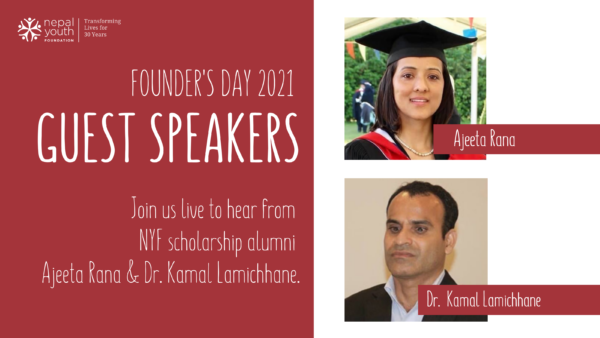
Ajeeta Rana is an NYF Scholarship alumna who received a nursing degree from one of the most renowned universities in Nepal. Since then, she has moved to London and has earned three more degrees (B.Sc in health and social care, M.Sc in healthcare leadership, and an MBA in hospital management). She currently lives in London with her husband as she pursues her fourth degree (MSc in Nursing) while she works as a nurse.
Dr. Kamal Lamichhane is currently an associate professor at Tsukuba University in Japan, and he is a NYF Scholarship alumnus and the first person with a visual impairment from Nepal to receive a doctorate degree. His fields of research include disability studies, economics of education, inclusive education, and education policy.
Hosts
We are so honored to have Dr. Jagadamba Pandit and Angela Pal be our hosts at this year’s event! Join us live on June 3rd at 6:30 p.m. PDT to hear Dr. Pandit and Angela speak to Olga, Som, and our guest speakers.

Angela Pal Angela has been in healthcare for over 23 years as a registered nurse and nurse practitioner. She is an assistant professor at the University of Colorado Anschutz Medical Campus and director of the Adult Gerontology Acute Care Nurse Practitioner program.
Angela was introduced to Nepal Youth Foundation, Olgapuri and the Nutritional Rehabilitation Hospital on her first trip to Nepal in 2018 for a medical mission. Her immediate thoughts were about how happy the children were, and how it seemed like a large family. She was immediately drawn to the openness and empathy of the Nepali children with each other and visitors. She observed firsthand the impact of the foundation on the children of Nepal, and the power of OlgaDidi’s vision and perseverance.
Dr. Jagadamba Pandit currently works at a community mental health center in the United States. After graduating from medical school in Nepal and finishing her residency in psychiatry at Virginia Commonwealth University, she completed a fellowship in addiction psychiatry. She has spent lots of time raising awareness about mental health issues both in the U.S. and in Nepal through radio programs and videos. She enjoys mentoring medical students and telling stories to children at Olgapuri.
Dr. Pandit came to know of NYF in 2004 through her husband, who was an NYF scholarship recipient in medical school. She then met Olga for the first time on Olga’s 80th birthday, and was extremely impressed with NYF’s mission and work. Since then, Dr. Pandit has been a devoted donor and supporter of NYF!
2021 Host Committee
Special thanks to our 2021 Host Committee members: Tanya Bodde, Chris Heffelfinger, Andrea McTamaney, Ron Rosano, and Greg and Barbara Rosston.
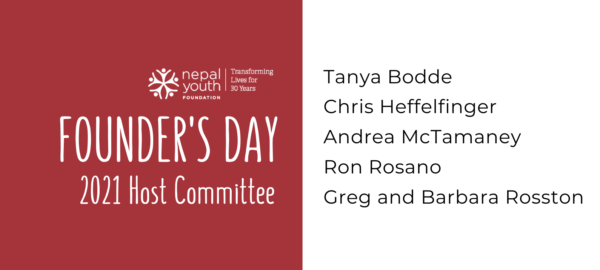
If you’d like to be on the Founder’s Day 2021 Host Committee, please contact Eric@NepalYouthFoundation.org for more information.
Volunteer Spotlight: Avipsa

In continued celebration of #NationalVolunteerWeek, NYF is excited to share another spotlight to honor one more wonderful volunteer! Today, we’re sharing our Q&A session with Avipsa, a Nepali-American high school student who has been volunteering remotely with the U.S. Office since the beginning of this year.
Let’s start with why you wanted to start volunteering for NYF. What was your calling?
I wanted to start volunteering with NYF because its purpose and values really resonated with me. Even as a Nepali person myself, I never really knew much about specific issues facing Nepali youth. Seeing that NYF dealt with many of these issues and how much it had accomplished, I knew that this was a place where I could truly make a difference and help Nepali youth receive the opportunities they deserved. It was also a way for me to connect to my own heritage and experience volunteering in the nonprofit sector.
Can you share what you are currently doing for NYF?
Currently, I am volunteering to help with social media and website design. I have been helping with the Editorial Calendar, which focuses on social media posts every month. I am also helping to create and build tests for UserTesting to ensure that our website is appealing and accessible. I have done a little bit of outreach as well.
What are you enjoying the most as a volunteer?
As a volunteer, I enjoy the creative freedom I have, as well as, access to multiple opportunities the most. I’ve been given a lot of freedom with themes for social media posts such as #FunFactFriday, which I came up with to educate the online audience more about Nepali culture. Before volunteering with NYF, I never heard about UserTesting and I didn’t know if I would be interested in doing it. NYF allowed me to try something new and it was actually a very informative experience.
What’s something you learned through volunteering for NYF?
By volunteering for NYF, I have learned about the importance of social media in raising awareness and social issues that Nepali youth face. As NYF focuses on social issues such as child servitude, lack of education, nutrition rehabilitation, and more, I learned that just one post can educate so many. Social media is a great way to raise awareness and bring attention to serious topics. It provides an environment to advocate and make a difference in peoples’ lives.
What are some of your goals for the future?
For my future in NYF, I hope to connect with more staff and hopefully, the youth! I also hope to recruit more volunteers as well. Personally, I would like to venture out into researching social issues facing Nepali youth and raising awareness about them. As someone who is very interested in psychology and mental health, my goal is to advocate for destigmatizing mental health and connecting with the Ankur Counseling Center for future research. As I grow further into my career, I hope to work in the field of psychology, psychiatry, or public health.
Any advice for other high school students who want to help make a difference?
My advice for other high school students that want to help make a difference is simple: start somewhere. Whether it is your passion, your niche, or something you recently discovered, the only way to make a difference is through action. The day that I found NYF was the same day I reached out to volunteer. Even though I didn’t know everything about the nonprofit, I knew it was advocating for a cause that I was also passionate about. Starting somewhere can push you to find new opportunities and eventually, reach your goals.
And lastly, can you share something fun about yourself?
When I visited Nepal in 2016, I went to multiple cities and locations. One of my favorite tourist attractions was Devi’s Falls in Pokhara. The waterfall was really extraordinary and mysterious as well. I found it really interesting that also goes through an underground tunnel. When I go back, I definitely want to visit there again!
We’re so deeply grateful to Avipsa for all the hard work she is doing to support our work! Thank you, from the bottom of our hearts!
Donor Spotlight: Eric Welty

How Eric, a retired carpenter, continues to generously support NYF
Eric Welty and his wife, Shelley, are long-time NYF supporters. They’ve been giving to NYF annually since 2009.
A couple years ago, we noticed the frequency of his gifts increasing throughout the year. His gifts also started to include notes at the bottom that perplexed us: “built-in desk”, “shelves,” or simply, “work.”
That’s when we learned that Eric, who had recently retired as a carpenter, had started donating his time and payment for labor to support NYF.
We were so touched to hear this, and reached out to Eric to see if we could learn more.
Eric was kind enough to chat with us for a quick interview in February 2021 to talk about how and why he supports NYF in this creative and generous way. Now, in honor of #NationalVolunteerWeek, we’re excited to share this with all of you a part of our wonderful conversation with Eric Welty.
Thank you again for agreeing to chat with us! Let’s start with your NYF story. How long have you known and/or supported NYF, and how did you come to know of us?
I allowed my higher self to guide me to Nepal, first. Nepal had a calling to me – and after reading about Nepal and learning more about Nepal’s needs, I was then led to NYF.
It was quite a few years ago, actually, back when NYF went by a different name.
Oh! That was back when we were named Nepalese Youth Opportunity Fund. Wow, you’ve been with us since the old days.
Right! And I feel so very fortunate to have found NYF.
Could you please elaborate on how you are currently supporting NYF?
My wife and I are both retired. We’re not wealthy, but we have enough. And as a retired carpenter, I’m still very healthy, and I actually still like working. But I wanted to volunteer now. And so I get projects from friends and friends of acquaintances, and then donate all the money that I make.
That’s wonderful. Thank you so much. What’s motivates you to continue these projects?
I’ve learned over the years that to be self-serving and feeding my desires to accumulate more stuff in my life is not very satisfying. I find that it’s far more satisfying to feed my inner peace by giving service to those who need it.
I can also make a fair amount of money here, but that money goes so much further in Nepal.
You’re absolutely right. What has been some of your favorite moments while doing this work?
I don’t know if I have a specific moment – but just knowing that the financial support is going to people who are most vulnerable.
Also, by donating, I know that the love and care that is extended by the staff in Nepal towards the children should help to promote a healthy and more adjusted adult. And in turn, that’ll perpetuate a better cycle going forward.
On a side note, another thing that’s interesting is that when I made a decision to begin this project, it seemed like the universe was helping in a way. The work comes in a timely manner; not all at once [laughter]. That also reassures me that I’m doing something worthwhile.
[Laughter]. Definitely! What a lovely thing to say though, about helping to perpetuate better cycles. That brings us to our next question: Do you have a favorite NYF program?
What struck me originally was the work you were doing to rescue and free girls sold into Kamlari indentured servitude. I found that inspiring. I realized what little money was needed save these girls. How could I not?
And when I would write a check at the end of the year, I would really feel like something was being done.
Our Empowering Freed Kamlari program is a really great one. I’m not sure if you’ve heard, but it’s actually coming to an end on our side. The freed girls have started their own nonprofit!
I heard! That’s great.
It really is.
You know, I’ve been watching NYF evolve as time has gone by, and I’m even more encouraged now than I was years ago.
That means a lot, Eric, thank you. Our last question is if you had any advice for other kindhearted folks who want to help out like you.
Run with whatever you find that resonates with you, like it did for me. Trust your inner guide!
Love it! Thank you so much!
We’re so grateful to Eric Welty for this special chat, and of course, for all that he’s doing to support our work. If you are fundraising for NYF or supporting our work in a creative way, and would like to be interviewed for a donor spotlight, let us know! E-mail us at: info@nepalyouthfoundation.org.
Our U.S. Office is Moving!

Our U.S. team is excited to announce that we’re moving from our Sausalito office to a beautiful space in San Francisco! Here’s our new address, effective immediately:
Nepal Youth Foundation
1016 Lincoln Blvd, Suite 222
San Francisco, CA 94129
Please update your records and discard any old donation envelopes with our old address attached to ensure any mail reaches us successfully! Our phone number will remain the same at 415-331-8585.
The new office, at the Tides Converge, is part of a collaborative workspace owned by a nonprofit and reserved especially for nonprofits. A major perk is lower rent, which will allow us to stretch each thoughtful gift further than ever to support Health, Shelter, Freedom, and Education for the children we serve!
NYF’s U.S. team is looking forward to the day when we leave COVID behind. We’re so excited to welcome partners, donors, friends, and other members of the NYF Family to our new home!
Please email us at info@nepalyouthfoundation.org if you have any questions about our new space.
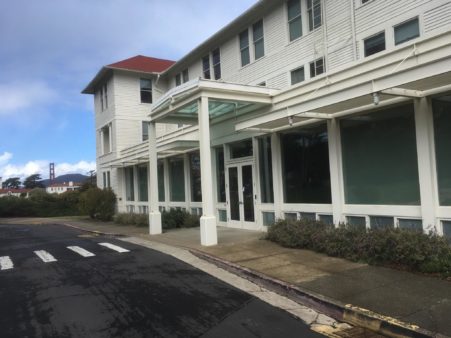
The Tides Converge is in The Presidio of San Francisco. Click here to see it on Google Maps!
CASHE Presents “Women of Nepal”
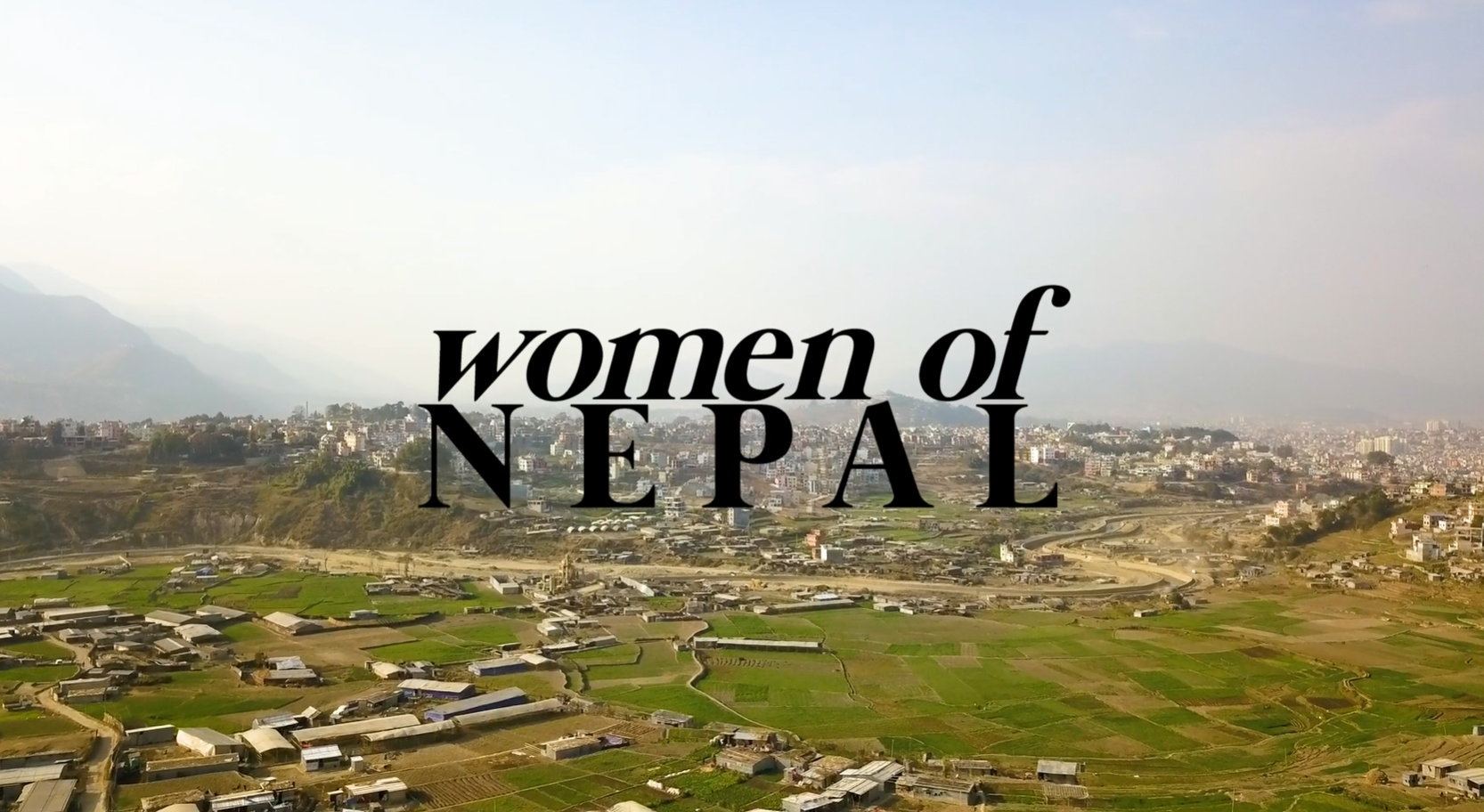
“Women of Nepal,” a short film produced through a partnership between multimedia journalist Rajneesh Bhandari, CASHE, and NYF, was released on International Women’s Day—March 8th, 2021. The film showcases the intersection of livelihood and motherhood for two profound women: one woman proudly supported by NYF’s foundational efforts and another working in manufacturing to produce CASHE cashmere.
We are so proud to share “Women of Nepal” with you now!
Cashmere Crafting
Sunita Maharjan, a craftswoman and mother of twins, has an undying passion for textiles and the cultural value Nepali garments carry across borders. This love for her trade is driven by more than skill; her children’s pride in her craft make it something to be done with dignity.
“Many people have the concept that women should do only household chores, but I don’t feel that way,” Sunita noted. “I feel very happy to know that the products we make are exported. Sometimes when I watch fashion shows on television I see people wearing dresses similar to what we make. It makes me very happy as I also make similar dresses.”
We at NYF are so grateful for partners like CASHE, who are truly devoted to elevating the remarkable craftspeople behind the luxury cashmere they bring to the international market. CASHE donates 10% of every purchase to NYF, and wherever possible, they use their press coverage to highlight the valuable work NYF does for Nepalese children.
CASHE was briefly featured in Sage & Sound recently, as well as on the Bri Books Podcast (CASHE/NYF are talked about at the 3:25 minute mark). CASHE is even featured in the April 2021 Issue of British Vogue!
Nutritional Rehabilitation Homes
Sangita Bhusa, a mother of two who has overcome tuberculosis, is forever grateful for the care she received from the Nepal Youth Foundation’s Nutritional Rehabilitation Home. Working since the age of seven, Sangita has overcome many difficulties supporting herself and her children. She returned to work a mere fifteen days after the birth of her first child.
“My mother suggested that it is better to work than to die of hunger. That is how I started working from an early age,” Sangita shared.
Sangita is just one of hundreds who benefit every year from the intensive nutritional care offered at NYF’s Nutritional Rehabilitation Homes (NRHs).
According to UNICEF, malnutrition contributes to over half of all child deaths in Nepal. NYF is working to combat that grim statistic with Nutritional Rehabilitation Homes built to accommodate malnourished patients discharged from nearby hospitals.
Before the development of NRHs, the Nepalese hospital system was not equipped to provide the long-term, holistic care needed to address chronic malnutrition in patients. Malnourished children were treated for acute illness and then discharged—often to continue suffering the long-term complications of malnutrition.
At NRHs, children are provided with holistic medical and nutritional care until they have reached a healthy weight. Meanwhile, their caregivers are trained in preparing delicious, nutrient-rich meals using locally-available, affordable ingredients tailored to their own home regions.
NYF has built a total of 17 Nutritional Rehabilitation Homes, including our flagship in Kathmandu Valley, which will remain under NYF control. The remaining 16 were designed to gradually transition into the government-run health system itself. So far, 15 have successfully made this transition, with the last, on track to transition in 2022. Training for NRH staff members takes place at the Kathmandu Valley flagship, which is well-known in the region as a valuable educational asset for anyone specializing in childhood nutrition.
Dhanyabad, CASHE!
We are so grateful to CASHE for highlighting our valuable nutrition programming in “Women of Nepal”! To learn more about our partnership with CASHE, please read our partnership announcement here and our spotlight on Nepalese cashmere here.
You may also visit CASHE’s online shop here.
To support the cautious reopening of NYF’s important nutritional programming, including our Nutritional Rehabilitation Home in Kathmandu Valley, please consider making a thoughtful gift today! Make sure your #LoveWorks for the women of Nepal… and their children, too!
Female Lawyers – A New Milestone for the Freed Kamlari Community

Female lawyers hold a special place in my heart—especially those embarking on this challenging career in a time and place in which women are not always welcome.
For those who do not know me, welcome! I am Olga Murray, the founder of Nepal Youth Foundation. Since the mid-1980s, I have dedicated my life to helping the children of Nepal to achieve their dreams. The work is an incomparable joy! Many of these kids’ successes have absolutely astonished me.
I have recently learned from Som that Bishnu Chaudhary has passed the bar exam in Nepal. This makes her the first Freed Kamlari to become a lawyer.
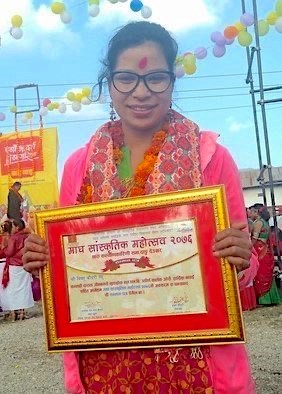
Kitchen Slavery
Bishnu’s father sold her into kamlari bondage when she was ten years old. Initially, he needed her wages to pay off a debt of under $40 (at the current rate of exchange), and later to assure that he could continue to work as a farmer for her employer. If she had stopped working, her family would have been left with no land to farm—and no way to feed themselves.
As a kamlari servant, Bishnu was denied an education and was instead forced to spend her childhood working long hours doing laundry, dishes, housework, and other tasks assigned by her family’s landlord. It was hard, demeaning work in an unforgiving environment. This was no place for a child.
(You can learn more about the kamlari practice, and NYF’s response, here.)
Rescue & Education
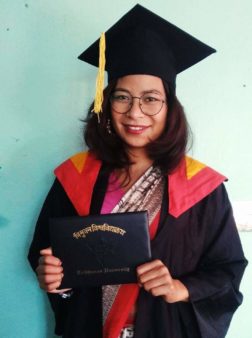
NYF rescued Bishnu from kamlari bondage in 2004, as our Indentured Daughters program (later the Empowering Freed Kamlari program) began to take root in the impacted Tharu communities.
She wanted desperately to go to school, and though her father at first refused, the teachers at the local school convinced him to allow her to enroll. Bishnu proved to be an outstanding student throughout her school years, taking as many opportunities for growth and development as she could. NYF has proudly supported her education from the beginning. Bishnu was admitted to law school in Kathmandu and graduated last year (pictured above).
Social Activism
During her student years, Bishnu was an outspoken and passionate leader in opposing the practice of kamlari, leading rescue operations of indentured children and convincing parents not to send their daughters away. She even risked being expelled from school because she insisted on liberating kamlari who were working for her own headmaster and teachers. Now that’s courage!
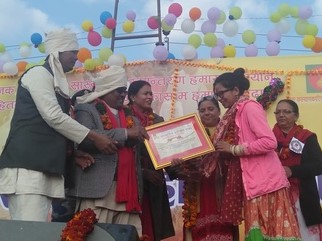
At Maghe Sankranti 2020, before the pandemic, Bishnu’s local government presented her with an award for the work she has done for her community (pictured left). I am gratified to see the ways these women, once mistreated and made to feel worthless, are being recognized and honored for their remarkable achievements.
Bishnu has continued in her activism, providing counseling and advice for former kamlari. Her aim is to advocate for girls and women in all aspects of the law – a tall order in Nepal, where paternalism reigns supreme.
A New Milestone

Female lawyers are a new phenomenon for Bishnu’s ethnic minority community, the Tharu. But Bishnu is just the first in the pipeline.
Up next is Urmila (left), the leader and heroine of the anti-kamlari movement, who was indentured at the age of six and did not begin school until she was 18, against the advice of almost everybody. Urmila is in her second year of law school and intends to work in the area of human rights, particularly women’s rights, after graduation.
How exciting to know Tharu women will have powerful female lawyers representing them in Nepal, and showing young girls what women can accomplish!
International Women’s Day 2021
I identify with these young women because, although I have never been sold into indentured servitude, I know the difficulty of embarking on a career in which women were not always welcome. I graduated from law school 66 years ago (gulp!), becoming a female lawyer at a time when there were few women in the profession, and the prospect of looking for a job was terrifying.
I was honored to spend my career in the company of those working to advance the rights of minorities in the United States. Below, I stand with my colleagues as a research attorney for California Supreme Court Justice Stanley Mosk.
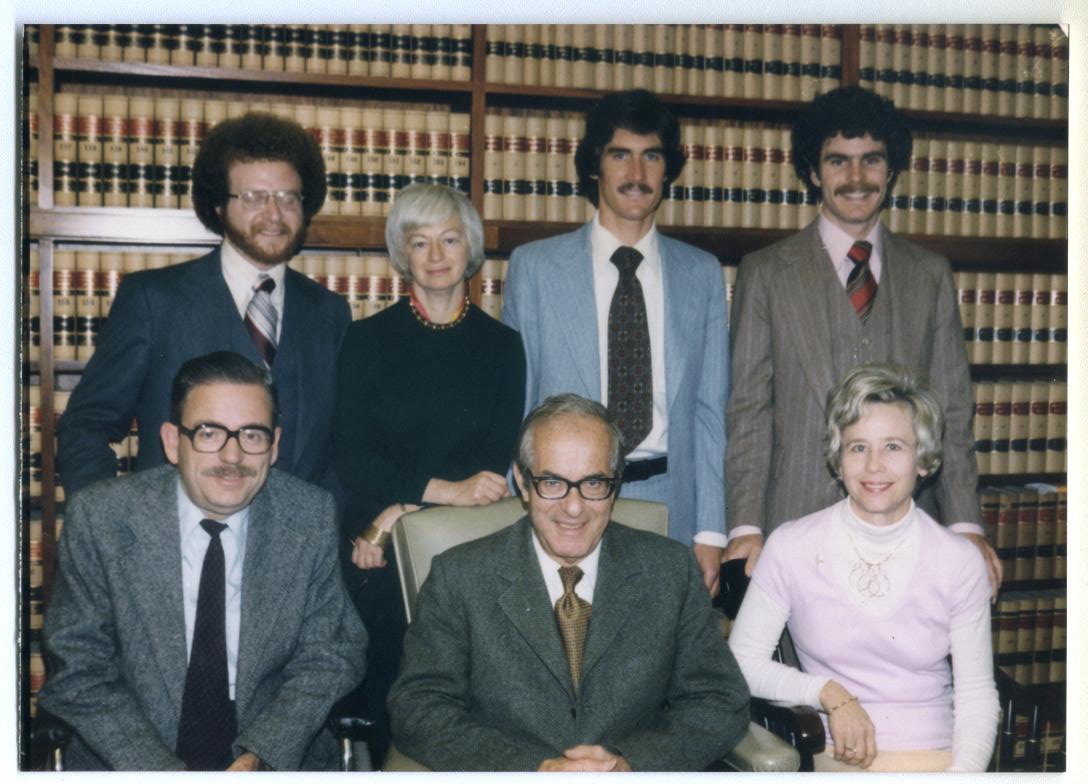
International Women’s Day, now held on March 8th, has been celebrated since 1911, when it was organized in Europe. Women then were campaigning for women’s rights to work, vote, be trained, hold public office, and end discrimination. Other early causes involved labor legislation about safety standards and child labor, combatting violence against women, and agitation for peace.
Now, this day is an opportunity to celebrate women’s achievements, raise awareness about women’s equality, and lobby for change.
The International Women’s Day theme in 2021 is “Choose to Challenge”—something the NYF Family has been doing for over 30 years, and something the Freed Kamlaris have done with gusto.
The work isn’t finished—but change is coming, one milestone at a time.
Today, for the Freed Kamlari communities, Bishnu, Urmila, and other daring women are choosing to challenge the status quo in their countries. I have full confidence that both Bishnu and Urmila will succeed in their goal to improve the status of women in Nepal because of their determination, their smarts, and the lessons they learned in their struggles to overcome injustice.
Mayama: CASHE’s Valentine’s Day Collection Shows #LoveWorks

Mayama is Nepali for “In Love.” CASHE’s founders, couple Giulia Giancola and Vlad Litinetsky, have built their luxury cashmere brand on love, empathy, and appreciation. CASHE introduced their partnership with NYF here, and their brand’s commitment to Fair Trade, gender equality, ethical working environments, empowered entrepreneurship for traditional Nepalese craftspeople, and cultural respect make them a joy to work with.
CASHE donates 10% of all their proceeds to NYF, and they’re generously using their brand’s media attention to boost NYF’s visibility. CASHE thoughtfully spotlighted NYF in this recent appearance in British Vogue, as well as in People’s Valentine’s list.

Mayama: the Collection
Now CASHE is offering a beautiful new Valentine’s Day collection called “Mayama”. These lovingly-designed His&Hers robes capture the timeless spirit of romance. Each purchase supports Nepalese farmers and artisans whose families have worked with cashmere for generations.
Explore Mayama here, and check out CASHE’s other luxurious collections. On the CASHE website, you can also learn about the ways philanthropy inspires and guides their brand.

Mayama indeed! We’re definitely feeling the love at NYF. Giulia and Vlad’s love for Nepal’s people and traditions fills us with joy.
Tradition
In a recent Forbes spot, CASHE briefly highlighted the intricate process behind cashmere’s unmatched comfort.
Giulia and Vlad fell in love with Nepal and its craftspeople on an adventure trip in December 2019, when they discovered the deep well of culture behind Kathmandu’s rich cashmere industry. They marveled at the quality of the handcrafted products available, examining scarves, blankets, and more to admire the differing techniques used by each vender.
Their tour guide and friend, Bipin, was delighted to share stories of cashmere’s history as they traveled between attractions.

Many people are surprised to learn that even now, 100% cashmere is crafted by hand. From the beginning, as Himalayan farmers hand-brush their cashmere goats to collect the precious raw fibers in the springtime, the process is so delicate and precise that no machine can do it. (And inventors have tried!)
The fibers are hand-sorted to isolate the special, soft, warm undercoat from the goats’ coarser outer hairs. Each goat only produces a small amount of this wool each year—not even enough for a single scarf. Nepalese families who have worked with cashmere for generations then wash, dye, and dry the wool before spinning it into thread or yarn—again, by hand.
Machines can’t accomplish the spinning because individual raw cashmere fibers are so short. Only well-practiced human fingers can ensure the spinning produces long, smooth, consistent, unbroken threads. This work is painstaking, and there are no shortcuts. The Nepalese artisans behind this work have devoted years of their lives to developing this skill.
Smoother than silk, finer than lambswool, warmer than alpaca; simultaneously durable, biodegradable, renewable, and sustainable—cashmere has been a global fixture of luxury fashion and comfort for centuries.
But so often, the history of cashmere as a textile erases the role of the traditional Himalayan artisans and craftspeople who developed this remarkable product in the first place.
CASHE wants to highlight and elevate these remarkable artists—and to ensure that Nepalese craftspeople are treated fairly in the global market.
“We want our standards as customers to translate into the manufacturing of CASHE,” Giulia says.
“There’s something so special about knowing how and where your clothes are made, and the cross-generational value that cashmere has in Nepal.”
Vlad adds, “There is a great deal of pride in the local craftsmen and women that ensures genuine quality. CASHE is more than ready-to-wear; it’s a tool for us to educate our consumers on the craft and its connection to Nepal.”
#LoveWorks
Vlad and Giulia’s love for Nepal extends far beyond cashmere.
“After spending time in Nepal and getting to know the beautiful culture, its people and their stories, we were motivated to give back and honor the values that brought our ideas to life. Now more than ever, it’s crucial that philanthropy is part of our brand DNA,” Vlad says.
That’s why 10% of all CASHE proceeds are donated to NYF—helping ensure Freedom, Shelter, Health, and Education for Nepalese children and young adults.

As CASHE and NYF take on 2021 together, we can expect extraordinary momentum around philanthropy, sustainability, and most importantly, education. Giulia is looking to disrupt philanthropic entrepreneurship and female leadership, bringing new meaning to worldly fashion. The Mayama Valentine’s Day collection is only a small a piece of that process—but one CASHE is proud to share, spreading love and kindness across the globe.
CASHE is making sure their #LoveWorks by keeping philanthropy and ethical entrepreneurship front and center as their brand grows. And NYF is so proud of the partnership we’re building!
As CASHE prepares to launch a new collection in March (promising striking new styles inspired by the natural wonders of Nepal!), we at NYF want to encourage attention to CASHE and brands like them. There are so many ways to ensure your #LoveWorks!
Happy Valentine’s Day!

